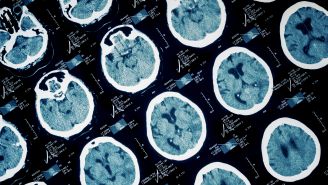Nearly 20 percent of American adults experience an anxiety disorder in any given year, such as generalized anxiety disorder or panic disorder, according to the Anxiety and Depression Association of America. Anxiety can affect everything from your job to your relationships and make it difficult to go about your day-to-day activities. But now, a study suggests untreated anxiety during middle age can affect your long-term brain health, as well.
Breaking down the findings
Anxiety disorders may make you more susceptible to dementia when you get older, according to a review of studies published in April 2018 in BMJ Open. Researchers at England's University College London analyzed data from four different studies that included almost 30,000 people in total, and that tracked them for at least 10 years. They found that people who had "clinically significant anxiety" were more likely to develop dementia later in life. Though more quality research is needed, one theory is this is due to an abnormal stress response that speeds up brain cell aging.
This makes sense and is in line with previous research, says Gary Small, MD, Director of the Geriatric Psychiatry division at the UCLA Longevity Center and Professor of Psychiatry and Biobehavioral Sciences at UCLA in Los Angeles, California. “We know that anxiety is associated with higher stress hormone levels,” he explains, "and, in fact, human studies have shown that if you inject someone with a stress hormone like cortisol it causes temporary memory impairment." He adds that other research has found that both humans and animals under chronic stress have smaller hippocampi, a key part of the brain responsible for memory.
Addressing your anxiety
Here are two things you can do to help cope with anxiety, that may also have an effect on your dementia risk.
Get enough sleep. People who suffer from anxiety often report trouble sleeping—and sometimes, it’s unclear whether lack of sleep is causing anxiety, or the anxiety is hurting your ability to get your ZZZs. Regardless, it’s important to make sure that you’re getting enough rest. In preliminary research, one night of sleep deprivation was associated with increased levels of beta amyloid in the brain, a substance that has been implicated in Alzheimer’s disease. If you have insomnia, speak to your doctor about treatment options.
Ask your doctor to screen you for anxiety and depression. If you have mild anxiety, you may find that you can get symptoms under control through simple lifestyle changes, like eating well, exercising and getting adequate sleep. But if you find that you’re still anxious or your symptoms are so severe they’re impacting your day-to-day activities, see your doctor. They may refer you to a therapist who can work with you to reduce your anxiety.
Cognitive behavioral therapy (CBT), for example, teaches you specific skills to cope. If you don’t see improvements within six to eight weeks, you and your doctor may consider medications—perhaps a class of anti-depressant medications called selective serotonin reuptake inhibitors (SSRIs). This can assist in getting your anxiety in check.
Ultimately, it’s important to remember that this is just one study review, and more research is needed before coming to any definite conclusions about long-term stress and dementia. However, if you are prone to anxiety, getting a handle on it can boost your overall mental and physical health, and it may help reduce your risk of eventually developing dementia in the bargain. Talk to your doctor about steps you can take to relieve your symptoms.






